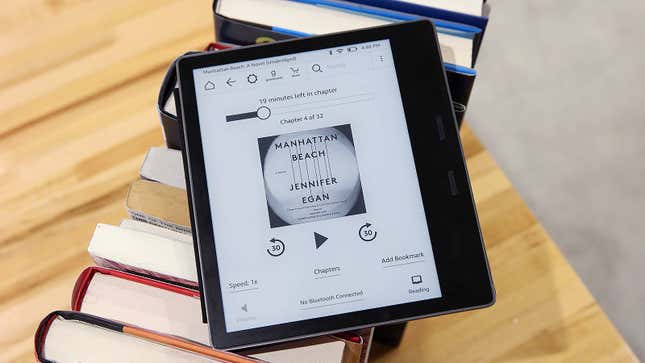
With schools and libraries closed, essential sources of education and entertainment have been cut off. That’s why, in March, the Internet Archive began digitizing books and offering them for free without restrictions as part of its National Emergency Library program. The country’s biggest publishers are now suing the Internet Archive over the free ebook program, citing copyright infringement.
It might seem a bit tone-deaf to file a copyright infringement lawsuit in federal court about a program offering free books to struggling folks this week of all weeks. But the Association of American Publishers’ member companies, which include Hachette Book Group, HarperCollins Publishers, John Wiley & Sons, and Penguin Random House, claim that Internet Archive is robbing authors and creators of hard-earned revenue by illegally scanning 1.4 million copyrighted works (i.e. not books that are in the public domain) and making them available for free.
“Today’s complaint illustrates that Internet Archive is conducting and promoting copyright infringement on a massive scale,” Maria A. Pallante, president and CEO of the Association of American Publishers, said in a statement announcing the lawsuit. “In scanning and distributing literary works to which it has no legal or contractual rights, IA deliberately misappropriates the intellectual and financial investments of authors and publishers and brazenly ignores the copyright law that Congress enacted.”
Internet Archive founder Brewster Kahle told the New York Times that his nonprofit is functioning as a sort-of library during the pandemic by making ebooks available for free, as libraries do. (To be clear, though physical libraries are closed in many communities, ebook lending is still an option for those with library cards.)
“As a library, the Internet Archive acquires books and lends them, as libraries have always done,” Kahle told the Times. “This supports publishing and authors and readers. Publishers suing libraries for lending books, in this case, protected digitized versions, and while schools and libraries are closed, is not in anyone’s interest.”
Internet Archive’s ebook lending program functions differently from a public library system’s, however. Libraries work with third parties like OverDrive to license ebook copies from publishers with a slew of restrictions—the licenses expire after a certain amount of time, and they also cost more than physical books do. Ebook loans work similarly to physical book loans: One copy is made available to one person for a limited time, then the loan expires and the copy is returned to the library. IA is buying its own physical books (or collecting donated copies) and then scanning them. Through its National Emergency Library Program, the ebooks are available to anyone for an unlimited amount of time.
I reached out to the American Library Association, which has also tussled with publishers over ebook lending restrictions, about the lawsuit, and will update if they release a statement.
Kahle told the Times that authors can opt out of including their works in the National Emergency Library, though it’s unclear if Internet Archive makes them aware of their inclusion before distributing their work in ebook form. He added that some authors do want their books to be part of the program, but if this open letter from the Authors Guild to Kahle is any indication, most of them seem pretty mad.
Is now a great time to file this lawsuit? No. Does it seem like Internet Archive is going through the proper channels to ensure that people have access to books and authors are compensated appropriately? Not so much. As always, support your local library.